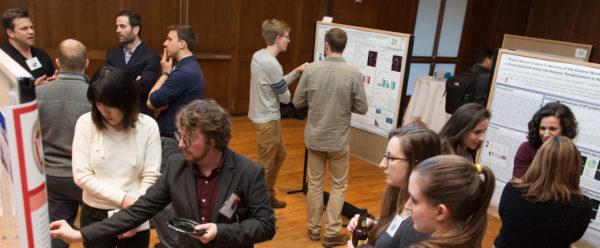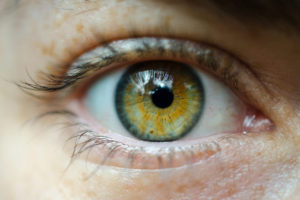Fueled by passion for their complementary fields of study, 25 years ago, Ned H. Kalin, MD, and Richard J. Davidson, PhD, founded and hosted the Wisconsin Symposium on Emotion. Each year since then, that passion has been palpable among participants, including psychiatrists, psychologists, scientists, clinicians, mental health professionals and all levels of trainees.
Such was the case in April 2019, when nearly 300 participants from within and beyond the University of Wisconsin-Madison gathered at Union South for a two-day meeting of the minds, sponsored by the HealthEmotions Research Institute (HERI) and co-hosted by Kalin and Davidson.
“The 25th annual symposium attracted leading experts to share insights on a range of topics related to the neurobiology of emotion and the complex interplay between the brain, psychiatric illness and health,” explains Kalin, the Hedberg Professor and Chair of the Department of Psychiatry at the UW School of Medicine and Public Health (SMPH) and director of the HERI.
The event’s focus on affective neuroscience—the study of the neural mechanisms underlying emotion—drew participants who are interested in the interdisciplinary field that combines neuroscience with the study of emotion, mood, personality, attention, learning, cognition and behavior.
At the symposium, internationally renowned experts tell one-hour stories about their research programs, providing the audience a glimpse into their processes, findings and intellectual trajectories. This format, followed by a discussion period led by Wisconsin trainees, provides a unique opportunity for scientists and clinicians-in training to interact with leaders in affective neuroscience. Poster sessions and break-out sessions provide further opportunities for developing researchers to learn, receive feedback and network, notes Davidson, the William James and Vilas Professor of Psychology and Psychiatry.
Another highlight of the meeting—its competitive Travel Award Program—boosts attendance among student researchers from throughout the United States. Grants allow 25 of the next generation of scholars to attend and present their research posters.
In the words of a 2019 travel award winner, Patricia Pehme, “It was one of the most exciting, intellectually stimulating and fun conferences I have attended.”
A doctoral student at the City University of New York, Pehme adds, “Many conferences claim to be ‘trainee-friendly,’ however, they remain impermeable to budding attendees. Here, I felt welcomed and respected as an aspiring professional. … All the wonderful speakers made us feel like we belonged by giving a platform to speak intimately with leading thinkers and fellow trainees—an indispensable opportunity to boost our confidence and stir the wheels of creativity, which then gives harvest to good science.”

Kalin and Davidson note that the Symposium on Emotion helped establish UW-Madison as a world leader in emotion and health research.
Over the past 25 years, the symposium has attracted more than 700 travel award winners from over 300 institutions worldwide, including 40 states, the District of Columbia and Puerto Rico; six Canadian provinces; and 40 countries.
“The innovative program has provided an unparalleled opportunity for some of the best and brightest young clinicians and scientists-in-training to network with peers and learn from leading scholars in emotion research. Participants come away with renewed focus and inspiration for their research and academic pursuits, often with novel ideas on possibilities,” says Davidson, who credits the symposium’s dedicated co-sponsors over the years with its success.
At the 2019 event, SMPH Dean Robert N. Golden, MD, greeted attendees and congratulated Kalin and Davidson on their contributions as leaders in this field.
“Their work has had profound consequences for our understanding of the biology of emotion, our concept of health, the prevention of disease and the promotion of resilience. The work of these scholars is emblematic of the Wisconsin Idea—the notion that our discoveries will benefit the people of our state, the nation and the world,” Golden told the participants.
Kalin and Davidson met as new faculty members in the early 1980s. Although they came from different academic backgrounds—medical research and psychiatry for Kalin and psychology and neuroscience for Davidson—they quickly discovered a shared interest in understanding the complex relationship between the mind, disease and health.
“In the academic world, there seems to be an unnecessary chasm between the disciplines of psychiatry and psychology, which made our alliance unique,” observes Kalin.
Davidson describes the era when these collaborations began as “a time when we were just beginning to get a glimpse into the human brain in more detail, propelled by developments in neuroimaging.” He explains, “For the first time, using MRI, we were able to view the structure of the brain in detail and assess the function of specific brain regions.”
Further, as the understanding of the human genome increased, it provided more tools that helped give insight into how the heritability of people’s traits and emotional styles influenced their risks to develop psychiatric problems.
“The idea of studying emotion was not at the forefront. Emotion was seen, more or less, as a derivative of bodily functions and stress, and the focus was predominantly on perception, cognition and mechanisms related to learning,” Davidson explains.
“Ned and I were among the first scientists in the world to study the neural mechanisms of human emotion.”
“In the academic world, there seems to be an unnecessary chasm between the disciplines of psychiatry and psychology, which made our alliance unique”
In 1993, building on this dual focus and with philanthropic support from the Hedberg family, they co-founded the HERI. It calls upon state-of-the-art methods developed for the study of illness to analyze relationships between emotions and health. Recognizing that understanding how states of mind influence the body is part of the next great frontier in brain research, HERI investigators aim to influence the overall understanding of the biology of emotion, concepts of health, prevention of disease and promotion of resilience.
Around this time, Davidson received a training grant from the National Institute of Mental Health (NIMH), which supports faculty in psychiatry and psychology and funds trainees who participate in discussion panels at the annual symposium. The T32 grant, for which Davidson has served as principal investigator for more than 20 years, is the longest standing training grant on emotion research at the NIMH.
Davidson and Kalin’s alliance influenced the trajectory of their careers and spurred collaboration between the UW-Madison Department of Psychology and the SMPH Department of Psychiatry; established a strong foundation for philanthropic support; and broadened opportunities for connections with other disciplines—such as the Neuroscience Training Program, which trains students for careers in research and teaching through doctoral degree work in neuroscience or MD/PhD degrees.
Kalin and Davidson gravitated toward studies that would provide a better understanding of the risk for psychiatric problems and negative impacts to physical health, as well as the flip side of examining the interplay between positive emotion and resilience in promoting longevity and health.
“We now understand that both negative and positive emotions are critical to our physiology and how we experience the world,” says Kalin, who stresses that these insights have resulted from studies not only in humans but also in animals, including the valuable use of nonhuman primates.
“Imaging lets us know which brain areas and mechanisms are involved in emotion processing, and animal models allow us to test hypotheses about the causal involvement of specific cells and neural circuits that relate to adaptive and maladaptive behavior, emotion and psychiatric illnesses,” he explains.
Federal grants, private donations, and SMPH and UW-Madison support combine as the foundation for Kalin and Davidson’s work. Case in point, the HERI building— funded by the Hedberg family—is home to the Wisconsin Institute for Sleep and Consciousness, Wisconsin Sleep and the Lane Neuroimaging Laboratory.
“Philanthropic support has made an extraordinary difference,” observes Kalin. “It has provided seed funding which allowed us to acquire the crucial resources that made these developments possible.”
He adds, “Thanks to support from the Lane family, the Department of Psychiatry is the only department in the nation with a 3T MRI scanner housed in immediate proximity to our clinics, allowing us to work with patients in a clinic and enter them into research projects to study brain alterations that underlie their suffering, with the goal of developing better treatments.”
Another advancement is the creation of the Center for Healthy Minds, which Davidson founded 10 years ago as his work focused increasingly on the scientific study of well-being and meditation, and how mindfulness and other ancient practices can be harnessed to help people flourish.
“By studying the mind in both illness and health, and examining the role that both negative and positive emotions play in brain functioning, we are developing a more comprehensive understanding of the complex relationship between emotions, health and illness,” says Kalin. “It is important to understand the mechanisms underlying anxiety and depression so we can develop better prevention and treatment strategies, including early interventions.”
“Equally, it’s valuable to understand the mechanisms underlying positive qualities of the mind— such as kindness and gratitude—which can play an important role in the process of recovering from psychological disorders because they can be cultivated to support healthy minds and thriving communities.”
Davidson concludes, “Equally, it’s valuable to understand the mechanisms underlying positive qualities of the mind— such as kindness and gratitude—which can play an important role in the process of recovering from psychological disorders because they can be cultivated to support healthy minds and thriving communities.”
-Amber Sebastian






